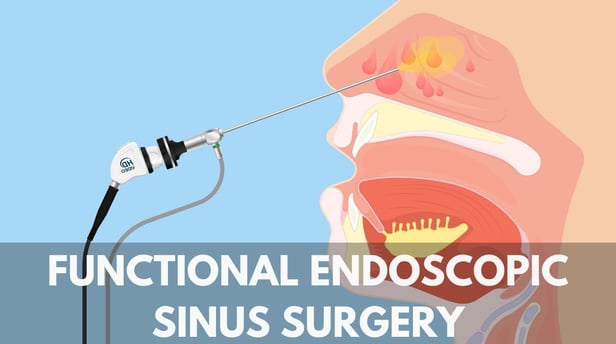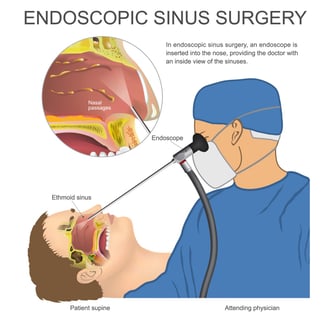FESS stands for functional endoscopic sinus surgery.
FESS surgery has many advantages, such as improving hearing, breathing, speaking, swallowing, and smelling functions; reducing pain, infections, inflammation, and bleeding; enhancing appearance and self-esteem; and preventing complications or progression of diseases.¹
10/31/20232 min read


Nasal polyps are noncancerous growths that may resemble a cluster of grapes. They may be located near the front of your nose or farther back, in your sinuses. Nasal polyps can cause symptoms that impact your quality of life, such as loss of smell, nasal pressure, congestion, sinus infections, etc.¹
FESS stands for functional endoscopic sinus surgery. It is a minimally invasive procedure that's used to unblock the sinus openings. Healthcare providers use nasal endoscopes — thin tubes with lights and lenses — to ease your sinus symptoms without making incisions in or around your nose. FESS can remove bone, diseased tissue or polyps that may be blocking your sinuses.²
FESS surgery has many advantages, such as improving hearing, breathing, speaking, swallowing, and smelling functions; reducing pain, infections, inflammation, and bleeding; enhancing appearance and self-esteem; and preventing complications or progression of diseases.
If you have chronic sinus inflammation or a chronic sinus infection that doesn’t improve with medical treatments, such as antibiotics and medications to manage allergies, you may be a candidate for FESS surgery. Your healthcare provider will review your medical history and do a physical examination. Tests they may use include nasal endoscopy and computed tomography (CT) scan.
FESS surgery usually lasts a few hours. You may need local or possibly general anesthesia, depending on the extent of the extractions from your nasal cavities. In most cases, you should be able to go home the same day as your surgery. Some people may need to stay at the hospital overnight.
The recovery from FESS surgery varies from person to person. You may notice slight bleeding from your nose and crusts in the weeks following surgery. You may also have some swelling and bruising around your eyes and nose. Your healthcare provider will give you instructions on how to care for your nose and sinuses after surgery. You may need to use saline sprays or irrigations, antibiotics, painkillers, or steroids to help with healing and prevent infection.
FESS surgery is generally safe and effective, but like any surgery, it has some risks and complications. These may include bleeding, infection, scarring, damage to nearby structures (such as the eyes or brain), loss of smell or taste, or recurrence of polyps.
I hope this information helps you understand nasal polyps and FESS surgery better. If you have any questions or concerns, please consult your healthcare provider.
FESS stands for functional endoscopic sinus surgery


